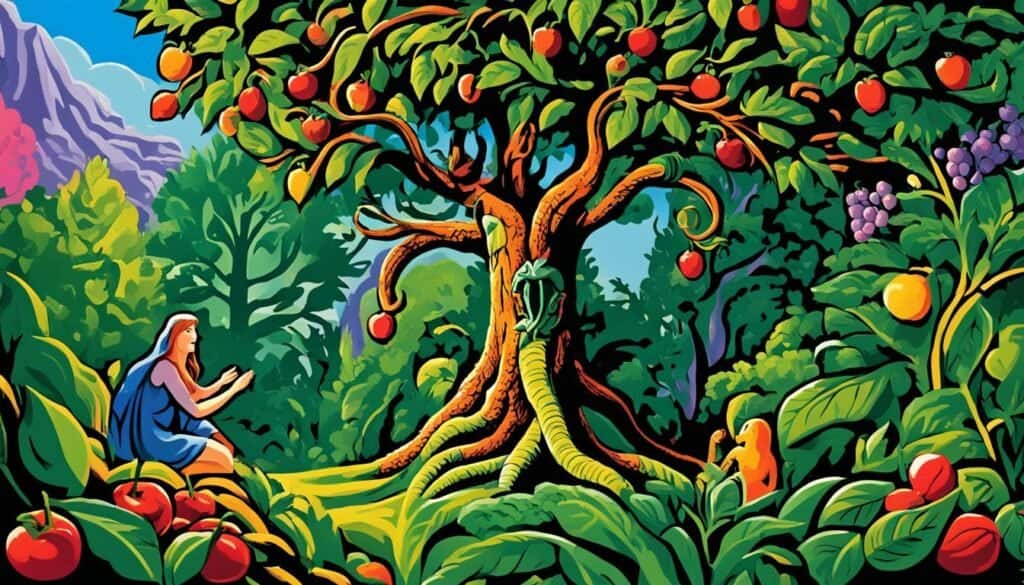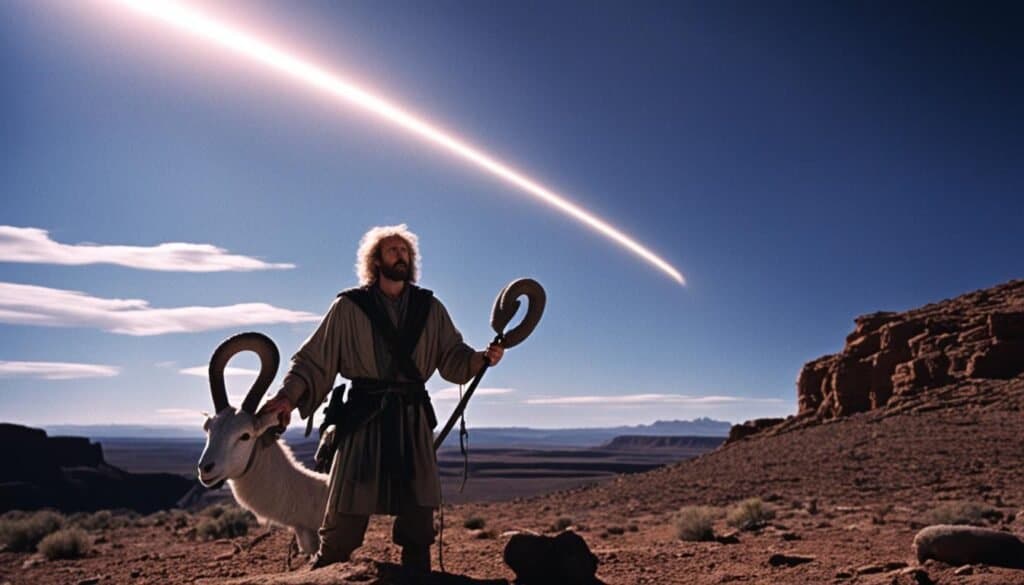Ever thought about the patterns and cycles in Genesis that affect our spiritual journey? These ancient stories still matter today. They teach us about faith and spirituality. Let’s explore these meaningful patterns from Genesis together.
Genesis starts with creating order out of chaos. It tells us about sin and its aftermath. These stories are full of themes, people, and God’s presence. They still challenge and interest those who believe.
This article will look at the key patterns and cycles in Genesis. We’ll see what they mean for our spirituality and faith. Let’s discover the timeless lessons in this old, but important book.
Key Takeaways:
- Genesis sets deep patterns and cycles for our spiritual journey shown in the Bible.
- It begins with creation and order, then moves to the fall and its effects, which remain important.
- The book highlights human responsibility, choice, and its outcomes.
- God uses blessings, covenants, and sacrifices to show a way of redemption and restoration.
- Genesis points to future promises and hope, revealing God’s ultimate plan.
Creation and Order: Bringing Structure Out of Chaos
The book of Genesis starts with God creating order from chaos. In the beginning, the earth was dark, formless, and empty. Then God spoke, bringing light and shape into existence.
Through a series of days, He organized everything. Light was separated from darkness on day one. Day two saw the creation of the sky above the waters. The third day made room for the earth, sea, and plants to grow.
This creation story gives each element its place. The sun, moon, and stars were put up high to light our days and to count our years. The sea and land were filled with life, showing God’s careful planning.
“And God said, ‘Let us make mankind in our image, in our likeness, so that they may rule over the fish in the sea and the birds in the sky, over the livestock and all the wild animals, and over all the creatures that move along the ground.'”
In this perfectly laid out world, God made humanity in His image. We were given the earth to care for, showing our special connection to God.
This orderly creation theme continues in Genesis. It shows God creating with a plan, from days of the week to different kinds of life on the land and in the sea.
Creation Narrative in Genesis
The Genesis story tells how God put everything in its place. It shows His care in creating a world for us. This world is filled with beauty and shows God’s creative power.
| Day of Creation | Acts of Creation |
|---|---|
| Day 1 | Separation of light and darkness |
| Day 2 | Separation of waters to create the sky |
| Day 3 | Separation of land and sea; creation of vegetation |
| Day 4 | Creation of heavenly bodies to govern day and night |
| Day 5 | Creation of sea creatures and birds |
| Day 6 | Creation of land animals and humanity |
| Day 7 | Rest |
Genesis teaches us God’s deep connection to the natural world. It shows His design and love for creation, including us. It’s a powerful story about God’s creativity and the importance of our planet.
Blessing and Covenant: Establishing Divine Agreements
In the book of Genesis, blessing and covenant are key ideas. God often blesses as He makes agreements with His creation. These divine agreements are very important in human history.
At the start, God blesses the world and every living thing. This blessing marks the start of a good relationship between Creator and creation.
Blessings in Genesis are not just for the world. God blesses people like Noah and Abraham. They get promises of doing well, staying safe, and making a big impact. These blessings are key in God’s grand plan.
“I will make you into a great nation, and I will bless you; I will make your name great, and you will be a blessing.”
God’s blessings often come with covenants, sacred deals between God and his chosen. These covenants show mutual commitment and the relationship’s rules. God promises things and asks people to join in His plan.
A major covenant is with Abraham. God promises him a big family, a land for his people, and blessings for all many.
The Covenant with Abraham
| Promise | Significance |
|---|---|
| Descendants | Builds the Israelites and lets God bless everyone through Abraham’s family. |
| Specific Land | Gives the chosen people a home, important for God’s big plan of saving. |
| Blessings | Includes all nations in God’s saving work, with spiritual blessings for believers. |
God wants a strong, deep relationship with us through blessings and covenants. These divine deals promise hope and come with a duty for us to keep our side of the bargain.
Reading Genesis shows us God keeps His side of the deals. He is always faithful in promises and love for His people.
Fall and Brokenness: The Introduction of Sin
In the book of Genesis, Adam and Eve’s disobedience showed humans’ break from God. The sin they brought in changed everything. It marred the perfect life God had made for them and introduced a fall that affected everyone.
They ate the fruit they were told not to, and their eyes opened to shame. This led to their awareness of their nakedness. Their act of disobedience had huge consequences. It affected them and their offspring for ages to come.
Their sin broke the harmony with God and nature. Relationships were strained, and a deeper separation came in. Adam, Eve, and the serpent faced God’s judgment. Life would become harder, marked by pain and toil because of their disobedience.
“Because you listened to your wife and ate fruit from the tree about which I commanded you, ‘You must not eat from it,’ “Cursed is the ground because of you; through painful toil you will eat food from it all the days of your life.” – Genesis 3:17
Also, they lost their place in the Garden of Eden. They were expelled from its perfect, harmonious life, marking a big separation from God. This rupture set humanity on a course of struggle, trying to deal with the effects of their actions.
The sin described in Genesis is more than a story. It points to our ongoing struggle. It shows our need for salvation and the longing for unity with our maker. It tells about the tough choices and the grace and forgiveness God offers us.

Biblical Perspective on Sin
In the Bible, sin is seen as going against God. It’s not just about doing wrong, but about our hearts too. Sin affects our connections with God, others, and even with ourselves. It’s a problem we all face.
Genesis starts this theme of sin and its impact. It also sets the scene for God’s big plan for saving us. This story is a warning about the danger of sin. But it also brings hope of being made right through Jesus Christ.
Thinking about Genesis reminds us of our need for healing. We should seek God’s forgiveness and accept His life-changing grace.
Judgment and Restoration: A Cycle of Consequences and Redemption
The book of Genesis teaches us about judgment and restoration. This story shows how human actions lead to consequences. God judges when we disobey, often through floods or exile. But in these stories, hope shines through the darkness.
Even with judgment, God wants to restore. We see this theme often. Genesis is full of forgiveness, promises of redemption, and choosing special people for His plans. These moments of grace tell us that judgment leads to a chance for restoration.
“For I will judge the world… but with everlasting lovingkindness, I will have compassion on you.” – Genesis 8:21
The tale of Noah and the flood is a classic example. When humans turn wicked, God sends a flood. But Noah’s family is saved, showing God’s intent to start anew. This judgment leads to a chance for people to reconnect with God.
Another story is the Israelites’ time in Egypt. Their disobedience led to slavery. But God sends Moses to free them, leading them to the Promised Land. This story mixes judgment with a clear theme of redemption.
God’s choice of certain people also highlights restoration. Abraham, Isaac, and Jacob were chosen for a special covenant. This plan leads to Jesus, who brings ultimate redemption for all.
The Cycle of Consequences and Redemption
Genesis unfolds in a cycle. Our choices bring judgment. Yet, in each judgment, there’s a way for redemption. This cycle ties actions to results but also shows God’s unending love.
Even with judgment, Genesis is a tale of hope. It points towards God’s grand plan of restoration. It tells us there’s always a chance for things to turn right.
Promise and Fulfillment: God’s Covenantal Promises
In the book of Genesis, God makes promises to both individuals and all people. These promises include things like land, many kids, and blessings. They lay down the early stories of the Bible. We see God keeping these promises, showing His faithfulness. This highlights His commitment to His people.
One big promise was made to Abraham in Genesis. God told him his descendants would be vast and gave them a land to live in. This promise was called the Abrahamic covenant. Genesis shows how this promise was kept. Abraham’s family grew huge and settled in Canaan, the promised land.
This promise wasn’t just for Abraham. God also promised great things to Isaac, Abraham’s son, and Jacob, Isaac’s son. He promised them many kids and the land as well.
“The Lord appeared to Abram and said, ‘To your offspring I will give this land.'” – Genesis 12:7
Genesis also talks about God’s promises of blessings. Noah was promised safety during the great flood. This promise of protection was for Noah, his family, and all the earth’s creatures.
Another important promise in Genesis was about a Savior. After the fall, God said the woman’s offspring would defeat the evil one. This was the first mention of a coming Savior. It shows God’s plan to fix our relationship with Him through the Messiah.

When we look at the promises in Genesis, we see God keeps His word. From starting a nation to the coming of a Savior, God’s promises are always true. They are a source of hope and certainty. And as these promises are fulfilled, they show us more about God’s goodness and love for His people.
Family and Lineage: Tracing the Generations
In Genesis, we see how important family and lineage are right from the start. It highlights God’s plan through certain families. The book shows the deep connection between us and those who came before.
Genesis tells the story of human life starting with Adam and Eve. It continues to Noah and his family. Along the way, many events shape the path forward according to God’s plan.
Genealogy teaches us we’re not alone but part of a long chain of people. Our family trees connect us with our past and future. It’s like being part of a big, extended family through time.
“The Lord has blessed and redeemed the generations that have gone before us, and He continues to work His purposes in and through us as we live out our roles within the family and lineage defined by Him.”
Genesis shows us the many sides of family life. We see happiness, sadness, conflicts, and resolutions. Exploring these stories helps us understand our family better.
These stories also talk about God keeping His promises through certain families. His faithfulness leads to the birth of Jesus Christ. It’s a key part of Genesis’s message.
Reading about family and lineage in Genesis teaches us about biblical history. It makes us value our family stories more. This reflection connects our own lives to the bigger story of God’s plan.
Let us cherish our family connections, understanding that we are part of a rich tapestry of generations that stretches back to the very beginning.
Sacrifice and Atonement: Foreshadowing Christ’s Ultimate Sacrifice
In the book of Genesis, the idea of sacrifice starts early. It hints at Jesus Christ’s big sacrifice to fix humanity’s sin. Genesis shows many sacrifices to God, often with blood, which is key in the Bible’s story.
The story of Abraham and Isaac is a key example. God asks Abraham to give Isaac up. Abraham was ready to do it, but God stopped him, offering a ram instead. This isn’t just about Abraham’s faith. It also hints at how Jesus’ sacrifice would play out later on.
In these early sacrifices, the blood is about making up for sins through Jesus. In the past, blood was big in making things right with God. The old ways were preparing for Jesus’ big sacrifice. He came to make things right for us once and for all.
“For without the shedding of blood, there is no forgiveness of sins.” (Hebrews 9:22)
These old stories in Genesis show what Jesus would do. By dying on the cross, Jesus “fulfilled” and made the old ways new. He’s like the final lamb sacrifice, showing God’s love and fixing our sins forever.
As Christians, we think Jesus dying means our sins can be forgiven. By trusting in Jesus, we’re made right with God. The Genesis stories remind us how much God loves us and plans to save us.
Foreshadowing of Sacrifice in Genesis
| Sacrificial Act | Significance |
|---|---|
| Abraham offering Isaac | Foreshadows God’s provision of a sacrificial substitute and points to Jesus’ future sacrifice |
| Various burnt and sin offerings | Shows the big role of sacrifice and blood in making things right with God |

Looking at Genesis helps us understand the idea of sacrifice and making up for sins. It’s a key part of the Bible that shines a light on God’s plan to help us.
Choice and Consequence: Human Responsibility
In Genesis, the theme of choice and its outcomes is key. We see characters making important decisions. These choices affect not only them but also others. It shows how what we choose can change our lives and those of others.
Adam and Eve’s story in the Garden of Eden is a classic example. Their choice to eat the forbidden fruit led to big changes. They were kicked out of paradise. And sin entered the world. This story sets up the idea of choice and consequence in the book.
Later on, we meet Noah. He lives in a time of great badness. Noah chooses to listen to God and build an ark. This saves him and his family from a huge flood. Noah’s story shows the power of choosing to do what’s right.
Abraham’s story is another example. God tells Abraham to leave everything and go to a new place. He decides to trust God and goes. Abraham’s faith turns him into the father of a nation. His story highlights how choosing to follow God can lead to good things.
Our choices, big or small, impact more than just us. Genesis teaches us we are active in our future. We shape our own destiny.
Genesis is full of stories showing what happens after choices are made. We see the effects on people, their families, and their societies. These stories warn us to think carefully about our choices. And they remind us we are in charge of what happens to us because of our choices.
Examples of Choices and Consequences in Genesis
| Character | Choice | Consequence |
|---|---|---|
| Adam and Eve | Eating the forbidden fruit | Expulsion from the Garden of Eden, introduction of sin |
| Noah | Building the ark | Survival of the flood, preservation of righteous lineage |
| Abraham | Leaving his homeland | Becoming the father of a great nation |
| Lot’s wife | Looking back at Sodom | Transformation into a pillar of salt |
This is just a glimpse. Genesis is full of stories about choices and their results. Reading them makes us look at our lives. We see that our choices really do matter. Even the smallest ones can make a big difference.

Hope and Anticipation: Pointing to Future Redemption
The final chapters of Genesis are filled with hope and anticipation. Even with sin and brokenness, we see promises from God. We see specific people chosen to help redeem our relationship with God.
From Genesis, hope grows out of brokenness. This highlights God’s constant faithfulness. The divine covenant with Abraham is a major part. Through it, God promises to bless all nations by his family.
The story of Joseph in Genesis is a powerful example of hope and restoration. Joseph was betrayed by his brothers and sold into slavery. But his faith and dream interpreting skills eventually led him to a high position in Egypt.
In a moving turn, Joseph forgave his brothers. This act shows that even after severe suffering, redemption and restoration are possible.
Genesis is not just a history of our beginning. It plants seeds of hope for God’s promises. It prepares us for future stories of redemption and restoration, which find their climax in Jesus Christ.
The image above shows a beautiful scene of redemption. It mirrors the hope and excitement Genesis brings us. It encourages us to trust in God’s ongoing plan, even in the midst of hardship.
Conclusion
We delved into the deep patterns and cycles in the book of Genesis. They have a big role in molding our spirituality and faith. The creation story shows God bringing order from chaos. He does this to create a stage for the unfolding of His plans. These include His blessings and covenants for both the world and people, sealing these with divine agreements.
The fall of humans into sin and brokenness marks a turning point. This event disrupts the perfect order God had set. Yet, God’s story doesn’t end with our failings. His judgments and acts of redemption show a pattern. This pattern reflects the cycle of consequences and the coming of salvation. Promises about land, descendants, and blessings see their fulfillment across the Bible. They reveal God’s constant faithfulness.
Family and lineage themes lay a strong foundation for later stories. They stress the importance of tracking family lines. Sacrifices, often requiring blood, hint at the sacrifice of Jesus. This shows a way to redemption. It also shows the significant effects of human choice on our lives and others.
Despite sin, Genesis ends on a note of hope and future redemption. God’s promises and choices of certain individuals hint at this. The repetitive patterns and cycles in Genesis prepare us for the Bible’s deeper journey. They greatly affect our spirituality and faith on this journey.
Affiliate Disclosure: "As an Amazon Associate I earn from qualifying purchases made from links in this post. We are a participant in the Amazon Services LLC Associates Program, an affiliate advertising program designed to provide a means for us to earn fees by linking to Amazon.com."

